- About Ramapo
- Academics
- Admissions & Aid
- Student Life
- Athletics
- Alumni
- Arts & Community
- Quick Links
- Apply
- Visit
- Give
FYS Courses by Topic and Section ID
INTD 101-36 - World Building Through Film
Tuesdays & Fridays, 1:45 – 3:25 p.m.
CRN 40366
Lucas Millard
Adjunct Faculty
Increasingly, the images that we consume shape the lives we lead. This section explores the power of the medium of film to both reflect upon and influence contemporary life at large, and to reflect inwardly on our own individual lives.
For nearly a century and a half, the cinematographic medium has been shaping the way that we interpret the world around us. Films have been idolized for their potential to stoke political action, to provide social criticism, to bring underrepresented issues to the center stage, to call for justice in an unjust world. Or. Then again, are they simply to entertain and let us forgot about our own worries for a while? We will explore select films (and associated film movements) from different areas around the world.
We will learn through in-class discussions and group exercises, and students will have the opportunity to flex their own storytelling prowess and self expression in a creative practice of their own choosing (ie filmmaking, podcasting, poetry, fiction writing, photography). This course is open to students of all backgrounds.
Peer Facilitator
INTD 101-37 - Intelligence: Who Gets to Decide
Tuesdays & Fridays, 1:45 – 3:25 p.m.
CRN 40640
Paula Carabell
Adjunct Faculty
Should we measure intelligence by test scores and the mastery of traditional academic subjects or should creative and/or moral values be considered the highest form of achievement? This course will explore such questions through both cinematic and textual means. We will choose from such films as Freedom Writers (2007), La Classe (2008), To Sir with Love (1967), Educating Rita (1983), Dead Poets Society (1989) and Imagine a School: Summerhill (2008) and consider them in light of ancient, modern and contemporary ideas on education and film.
Peer Facilitator
INTD 101-38 - Creativity and Entrepeneurship
Tuesdays and Fridays, 3:40 – 5:20 p.m.
CRN 41190
Samantha Simone
Adjunct Faculty
Every one of us is the President and CEO of our own business…That business is YOU! This FYS section will introduce students to the skills and mindset needed to create, pitch, and market their own unique brand, project, organization, etc. Using platforms such as canva, video, and social media students will explore ways to market their unique personalities or projects to cultivate future opportunities, create an online presence, and much more. Research, self-awareness, and creativity will be essential in exploring being a modern day entrepreneur.
Peer Facilitator
INTD 101-39 - The Ethics of Star Trek
Tuesdays and Fridays, 3:40 – 5:20 p.m.
CRN 41311
Carolyn Herring
Adjunct Faculty
Using episodes from the various Star Trek series, we will address questions such as, “What does it mean to be human?” “In a society with limited resources, how do we decide who lives and who dies?” “Is there such a thing as duty or moral laws?” Examining how philosophers can help guide us in addressing these questions, students will learn three basic methods of doing ethics (deontology, utilitarianism and contextualism), and how to apply them to narratives with a critical eye while proposing their own answers to the ethical dilemmas presented.
Peer Facilitator
INTD 101-40 - EcoArts: Nurturing Your Inner Eco-Warrior
Tuesdays & Fridays, 3:40 – 5:20 p.m.
CRN 41310
Zac Skinner
Adjunct Faculty
This course explores the powerful connection between Landscape & Nature focused Arts, with humanity, ecology, and mindfulness. We’ll trace this relationship back in time, from centuries past to contemporary eco-artists, discovering how art can inspire environmental reflection and social change. Through hands-on outdoor exploration and mindful practices, you’ll learn to document your experiences and unleash your creativity using diverse artistic techniques (drawing, video, writing, performance or sculpture). Collaborate with peers on impactful projects. No prior experience in art, ecology, or mindfulness is needed—just curiosity and an open mind. Join us to become an eco-conscious creator and a force for positive change.
Peer Facilitator
INTD 101-41 - Science and Misinformation
Tuesdays & Fridays, 3:40 – 5:20 p.m.
CRN 40434
Emma Rainforth
Professor of Environmental Science/Geology
What are the consequences of scientific misinformation, misrepresentation, denial, and hoaxes & fraud – collectively “pseudoscience”? Why does pseudoscience persist? Some specific examples we’ll explore include vaccines-cause-autism, HIV-doesn’t-cause-AIDS, and climate-change-isn’t-real.
Peer Facilitator
INTD 101-42 - Art & Activism: The Politics of Memory, Place, and Authority
Mondays & Thursdays, 4:10 – 5:50 p.m.
CRN 40331
Joel Weissman
Associate Professor of Art (Sculpture)
This seminar explores the intersections of art and activism through the lenses of memory, place, and authority. Students will examine how artists engage with political and historical narratives, reclaim spaces, and challenge dominant power structures. Through research, visual analysis, and creative practice, students will investigate how visual culture can function as both a tool of resistance and a means of reimagining collective memory. Emphasis will be placed on contemporary and historical movements, site-specific work, and the role of institutions in shaping public discourse.
Peer Facilitator
INTD 101-44 - Constipated is not Constipado: The Relevance of World Languages in Health Care
Mondays & Thursdays, 11:20 a.m. – 1:00 p.m.
CRN 40626
Natalia Santamaria-Laorden
Professor of Spanish
In this course, we will examine how languages operate and the difficulties of translating and interpreting in health care and human services contexts, as well as the legal frameworks in which languages operate in health care contexts in the United States. We will learn about the emotional attachment to your first language and how using a second one can be used as a defense mechanism to repress upsetting emotions. Specifically, we will focus on the needs of native speakers of Spanish and Spanish-English bilingual speakers. We will also look at historical cases of misinterpretation in depth, like Willie Ramirez’s, that led to tragic consequences. The third module of the course will include an introduction to Spanish vocabulary and expressions related to health care and an understanding of cultural specificities. Finally, in the fourth module, students will explore a topic of their choice in regards to languages and health care, as well as representation of health in movies like “The Farewell”, “Inside Out”, “Super Size Me”, etc.
Peer Facilitator
INTD 101-45 - The History of Everything
Tuesdays & Fridays, 3:40 – 5:20 p.m.
CRN 40436
Tae Kwak
Associate Professor of History
This section is recommended for incoming history majors, as well as any undeclared or other major student interested in happiness.
The founding document of the United States declares our natural rights include “Life, Liberty and the pursuit of Happiness.” But how do we pursue happiness? What does that even mean? On a primal level, humans seek meaning and significance, including origins. According to Socrates, the freedom and vocabulary to pursue meaning is fundamental to a “life worth living.” The study of history is a study of origins, but it is also a guide for the future. The past never changes, but what we need — personally, nationally, globally — from the past in order to make the best decisions for the present and for our future, changes with our circumstances. That is why we always need new stories of the past, relevant histories for our present.
Peer Facilitator
Copyright ©2026 Ramapo College Of New Jersey | Statements And Policies | Accessibility | Contact Webmaster.
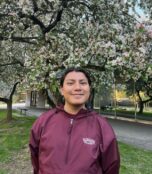
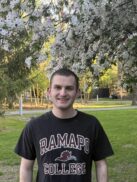
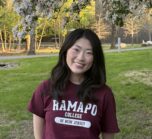
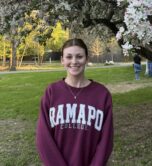
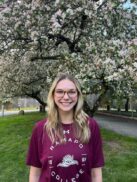
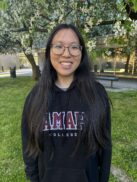
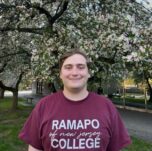
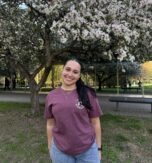


Follow Ramapo